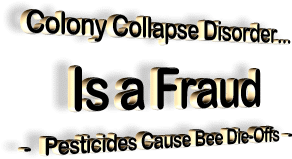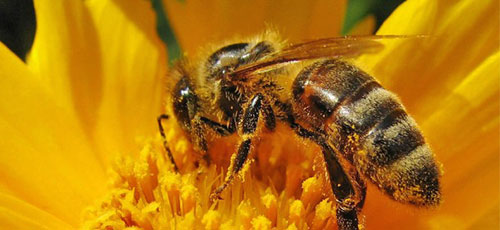|

by Heidi Stevenson
May 16, 2013
from
GreenMedInfo Website

Years
ago, Gaia Health informed that bee dieoffs
are a direct result of pesticide nerve
agents called neonicotinoids.
The term, Colony
Collapse Disorder, is fraudulent, designed
to direct attention from the known cause.
Agribusiness,
the poison manufacturers making
death-producing pesticides, is the other
face of Big Pharma.
The massive bee die-off is not a great mystery. Colony Collapse
Disorder is poisoning with a class of pesticides called
neonicotinoids.
Clothianidin, a neonicotinoid
pesticide manufactured by Bayer, has been clearly linked to die offs
in Germany and France.
Although the bee die-offs that have occurred recently are more
severe, there have been many in the past from the same and similar
products. In North Dakota, a lawsuit was filed against Bayer for the
loss of their bees in 1995, the result of spraying rapeseed with
imidacloprid.
In 1999, the same product was banned in
France for use as a seed dressing for sunflowers when they lost
one-third of their hives after widespread spraying. In 2004, it was
banned for use on corn. Recently, France refused to approve Bayer's
request to sell clothianidin.
Clothianidin and imidacloprid are both members of a class of
pesticides called
neonicotinoids. They are well known
as insect neurotoxins, especially with regard to bees.
The spokesperson for the
Coalition Against Bayer Dangers,
based in Germany, stated:
We have been pointing out the risks
of neonicotinoids for almost 10 years now. This proves without a
doubt that the chemicals can come into contact with bees and
kill them.
These pesticides shouldn't be on the
market.
Not a Surprise
That neonicotinoids are potent neurotoxins, especially in insects,
is unsurprising.
They were developed for precisely that
purpose. Bayer says that their use is safe for bees, when used
according to instructions. This involves using a glue that keeps the
pesticides stuck to the seeds on which they're used.
There are many problems with this. Agribusiness corporations are
known to evade anything that costs them money. The glue costs money.
The equipment and personnel required to apply it costs money. More
careful pesticide application to try to keep it from becoming
airborne costs money.
Obviously, both unscrupulous
Agribusiness farmers and unknowing small farmers - not to mention
home gardeners - will, at least occasionally, not use the glue.
Even then, it's impossible to believe that a fair amount of these
pesticides won't become airborne. Further, their residue will poison
the soil. It will be passed on into foods, which means that insects
will come into contact with it there.
Pharmaceutical
Connection
Isn't it interesting that a major pharmaceutical manufacturer,
Bayer, also makes a product that is a poison by design? Bayer is not
an exception. Many, if not most, do business in both arenas.
That alone should give pause for
thought.
Here's a list of corporations - not expected to be complete - that
profit in both pharmaceuticals and pesticides:
-
American Home Products
-
AMVAC
-
Astra Zeneca
-
Aventis
-
BASF
-
Bayer
-
Dow Chemical
-
Dupont Chemical
-
Merck
-
Monsanto
-
Novartis
-
Pharmacia
Is it an accident that most of Big
Pharma also manufactures pesticides? Is there a connection between
the two types of products? Do the pharmaceutical arms of these
corporations profit on the illness caused by the pesticide arms?
You can decide...
Mythical
Disease
Disease mongering is a well-worn technique
used by Big Pharma to create new
diseases - define, name, and make household terms - for the purpose
of selling chemicals called drugs.
The same technique has been used to
cloak massive bee die-offs with an air of mystery.
Colony Collapse Disorder is a
false name that serves to mislead the public into believing that
there's a new, mystery disorder, probably something very complex,
that needs tons of money to be thrown at it so that every possible
angle can be studied.
The reason is simple. By misdirecting
the public, and apparently many professionals too, the real reason
for bee die-offs is obscured.
This is very much like
the misleading pseudo science that supposedly
debunks global climate change by giving a false
impression that there is no consensus among scientists. By stirring
pesticides into a mix of other supposedly possible causes, such as
'bacterial infections', 'fungal infections', and 'environmental
stress' - all assuredly concerns with bees, but none of them new - a
false controversy is created.
That results in precious time being
wasted, while we really do move into
a world without bees. At the same
time, money is being thrown at scientists, who should know better,
but being just as human as the rest of us, they're tempted.
Eventually, the real cause starts to become obvious, as is happening
now in bee die-offs.
However, the guilty party, the one
making obscene profits by selling neurotoxic poisons that destroy
the earth, launches a campaign of disingenuous lies, misdirection,
and lawsuits to continue to sell their contaminants as long as
possible.
Meanwhile, we're being told that we must prepare to live in a world
without bees, as if it's inevitable. All because of Colony Collapse
Disorder, a cleverly marketed nonexistent disease.
We live in fear of the implications of
no bees, when the real threat is poisons manufactured for the sole
benefit of obscene profits.
How to Avoid
These Neurotoxins
Neonicotinoids are used in Agribusiness and home gardens.
To help the reader avoid these products,
here are some of their generic names, along with as many brand names
as could be found.
-
The neonicotinoids include:
-
acetamiprid
-
dinotefuran
-
clothianidin
-
imidacloprid
-
thiamethoxam
-
Acetamiprid and dinotefuran are
manufactured by many companies.
-
Brand names for imidacloprid
include:
-
Kohinor
-
Admire
-
Advantage
-
Gaucho
-
Merit
-
Confidor
-
Hachikusan
-
Premise
-
Prothor
-
Winner
-
Brand names for clothianidin
include:
-
Gaucho
-
Titan
-
Clutch
-
Belay
-
Arena
-
Brand names for acetamiprid
include:
-
Brand names for thiacloprid
include:
-
Brand names for thiamethoxam
include:
-
Actara
-
Cruiser
-
Helix
-
Platinum
-
Centric
-
Neonicotinoids:
Resources
|

